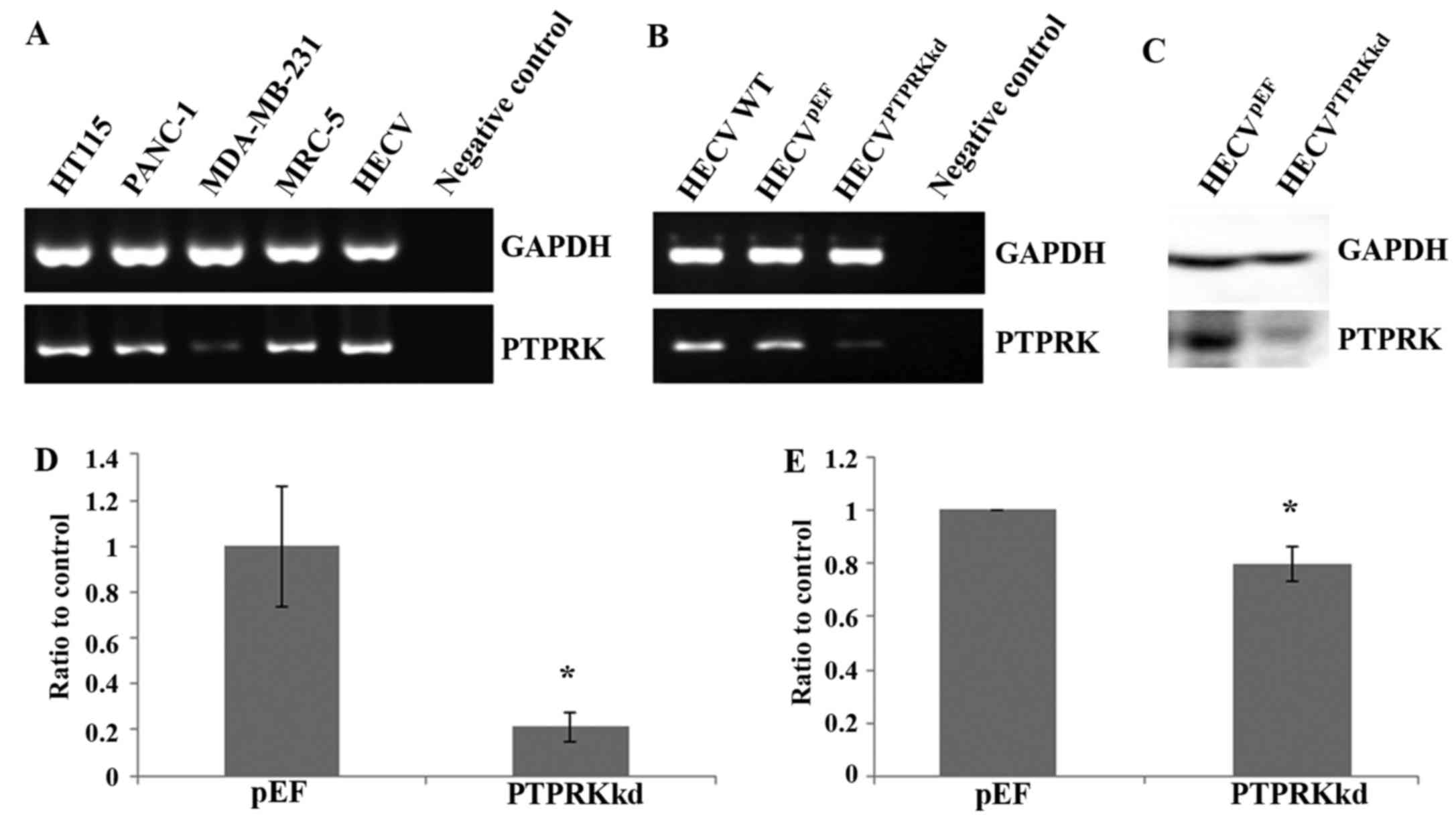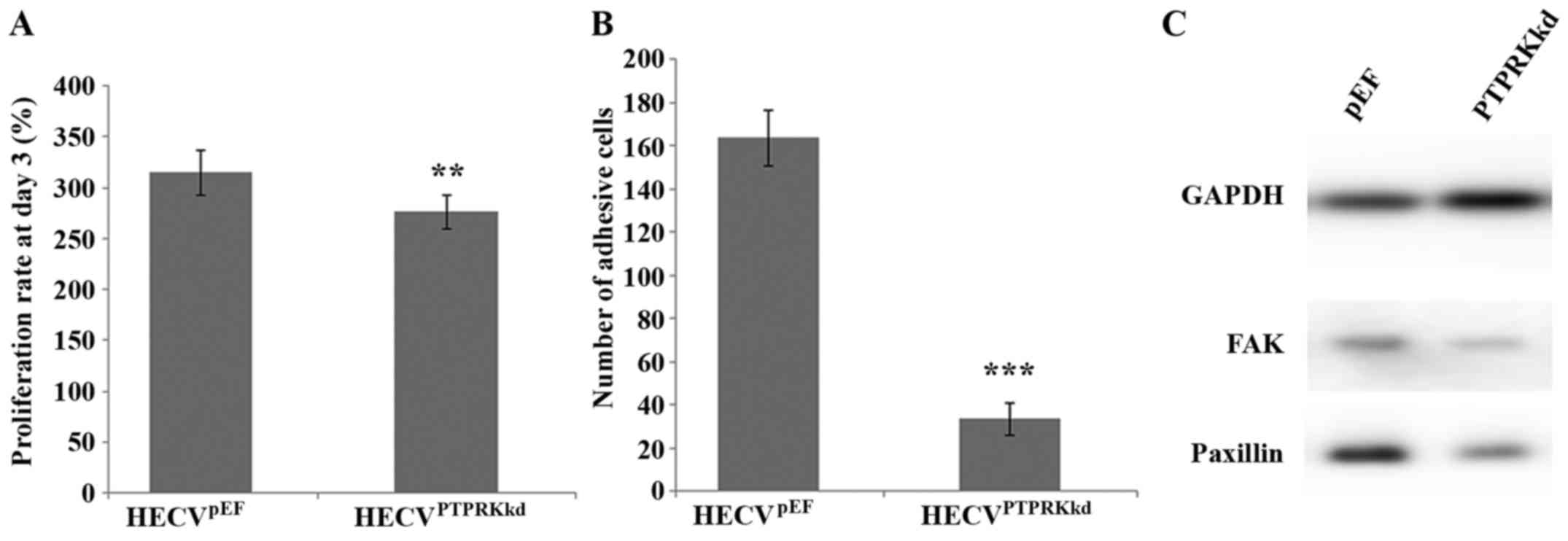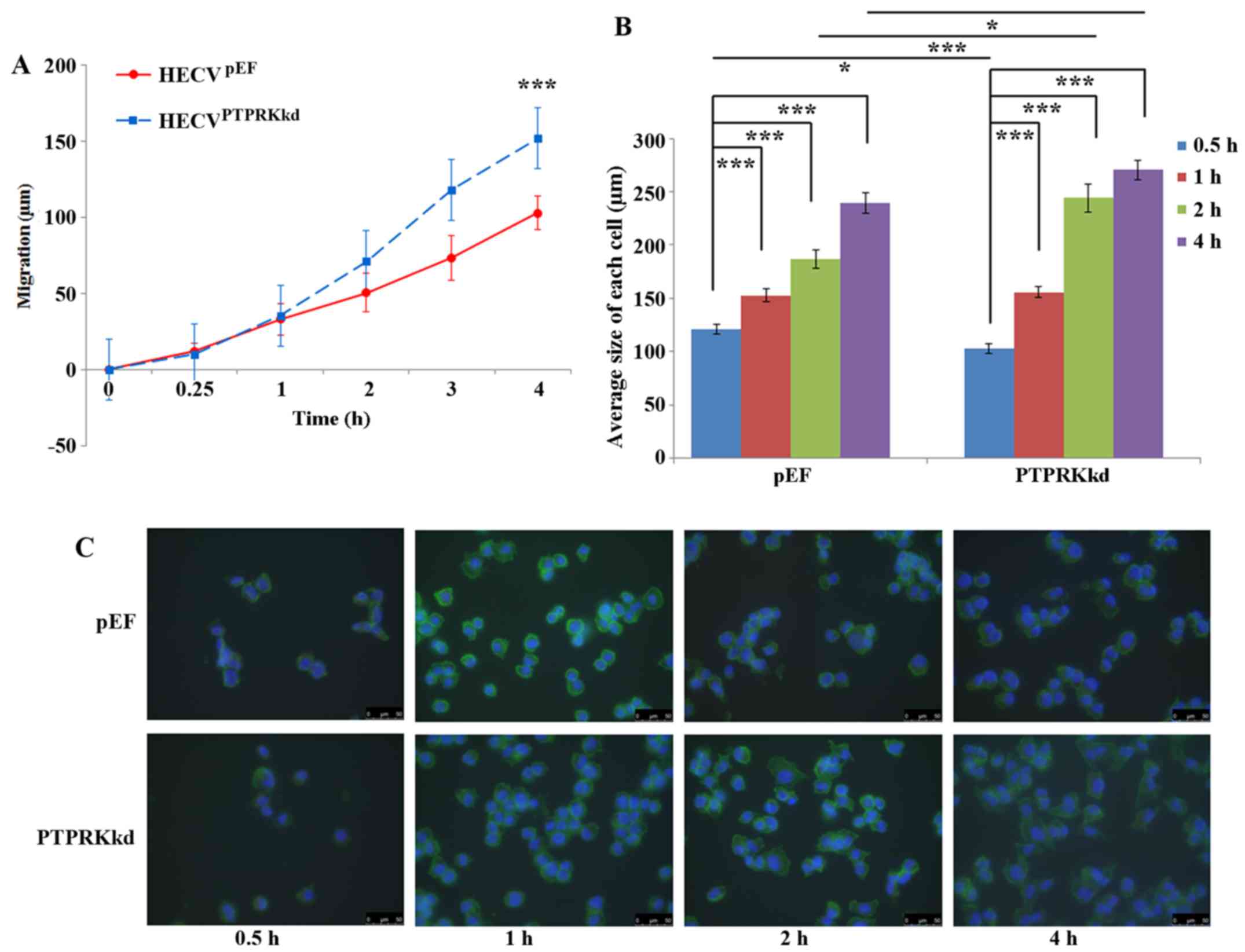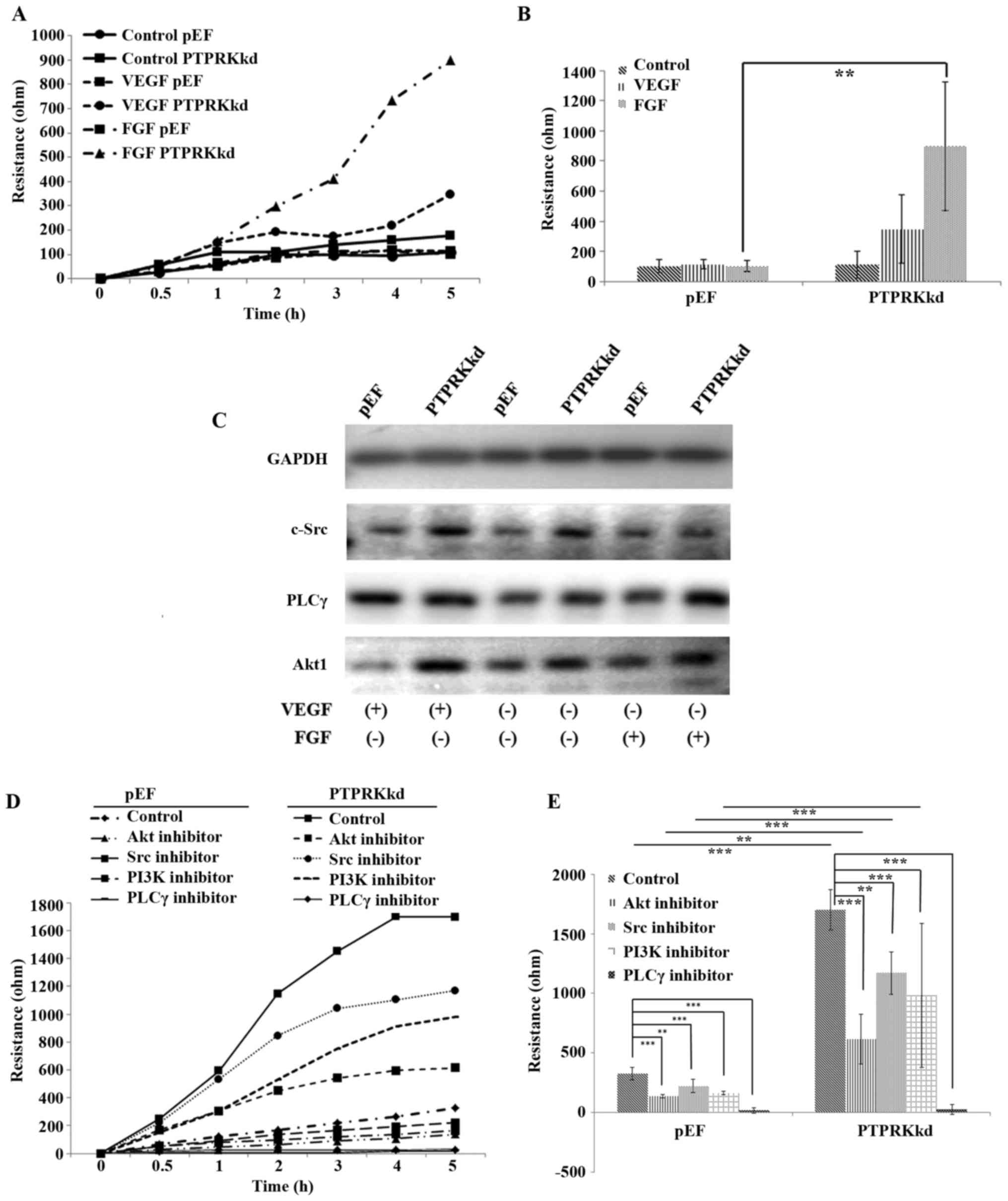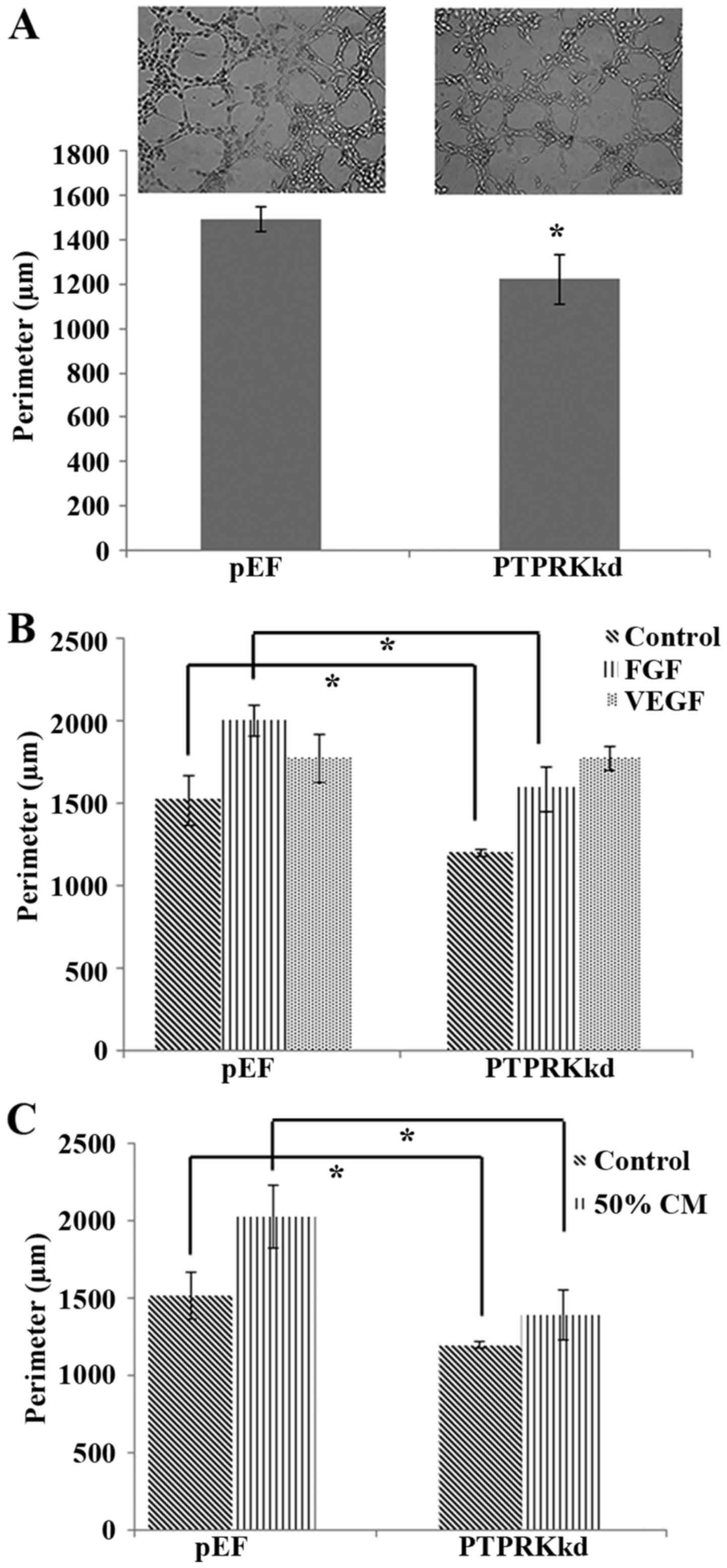|
1
|
Tseng JC, Chen HF and Wu KJ: A twist tale
of cancer metastasis and tumor angiogenesis. Histol Histopathol.
30:1283–1294. 2015.PubMed/NCBI
|
|
2
|
Wang Z, Dabrosin C, Yin X, Fuster MM,
Arreola A, Rathmell WK, Generali D, Nagaraju GP, El-Rayes B,
Ribatti D, et al: Broad targeting of angiogenesis for cancer
prevention and therapy. Semin Cancer Biol. 35(Suppl): S224–S243.
2015. View Article : Google Scholar : PubMed/NCBI
|
|
3
|
Semenza GL: Cancer-stromal cell
interactions mediated by hypoxia-inducible factors promote
angiogenesis, lymphangio-genesis, and metastasis. Oncogene.
32:4057–4063. 2013. View Article : Google Scholar
|
|
4
|
Gacche RN and Meshram RJ: Angiogenic
factors as potential drug target: Efficacy and limitations of
anti-angiogenic therapy. Biochim Biophys Acta. 1846:161–179.
2014.PubMed/NCBI
|
|
5
|
Khan KA and Bicknell R: Anti-angiogenic
alternatives to VEGF blockade. Clin Exp Metastasis. 33:197–210.
2015. View Article : Google Scholar : PubMed/NCBI
|
|
6
|
Waters JP, Pober JS and Bradley JR: Tumour
necrosis factor and cancer. J Pathol. 230:241–248. 2013. View Article : Google Scholar : PubMed/NCBI
|
|
7
|
Yadav L, Puri N, Rastogi V, Satpute P and
Sharma V: Tumour angiogenesis and angiogenic inhibitors: A review.
J Clin Diagn Res. 9:XE01–XE05. 2015.PubMed/NCBI
|
|
8
|
Ferrara N, Gerber HP and LeCouter J: The
biology of VEGF and its receptors. Nat Med. 9:669–676. 2003.
View Article : Google Scholar : PubMed/NCBI
|
|
9
|
Koch S, Tugues S, Li X, Gualandi L and
Claesson-Welsh L: Signal transduction by vascular endothelial
growth factor receptors. Biochem J. 437:169–183. 2011. View Article : Google Scholar : PubMed/NCBI
|
|
10
|
Olsson AK, Dimberg A, Kreuger J and
Claesson-Welsh L: VEGF receptor signalling - in control of vascular
function. Nat Rev Mol Cell Biol. 7:359–371. 2006. View Article : Google Scholar : PubMed/NCBI
|
|
11
|
Eklund L and Olsen BR: Tie receptors and
their angiopoietin ligands are context-dependent regulators of
vascular remodeling. Exp Cell Res. 312:630–641. 2006. View Article : Google Scholar
|
|
12
|
Nakazawa Y, Kawano S, Matsui J, Funahashi
Y, Tohyama O, Muto H, Nakagawa T and Matsushima T: Multitargeting
strategy using lenvatinib and golvatinib: Maximizing
anti-angiogenesis activity in a preclinical cancer model. Cancer
Sci. 106:201–207. 2015. View Article : Google Scholar :
|
|
13
|
Turner N and Grose R: Fibroblast growth
factor signalling: From development to cancer. Nat Rev Cancer.
10:116–129. 2010. View
Article : Google Scholar : PubMed/NCBI
|
|
14
|
Jiang WG, Martin TA, Parr C, Davies G,
Matsumoto K and Nakamura T: Hepatocyte growth factor, its receptor,
and their potential value in cancer therapies. Crit Rev Oncol
Hematol. 53:35–69. 2005. View Article : Google Scholar
|
|
15
|
Du Y and Grandis JR: Receptor-type protein
tyrosine phosphatases in cancer. Chin J Cancer. 34:61–69. 2015.
View Article : Google Scholar :
|
|
16
|
Nikolaienko RM, Agyekum B and Bouyain S:
Receptor protein tyrosine phosphatases and cancer: New insights
from structural biology. Cell Adhes Migr. 6:356–364. 2012.
View Article : Google Scholar
|
|
17
|
Tautz L, Critton DA and Grotegut S:
Protein tyrosine phosphatases: Structure, function, and implication
in human disease. Methods Mol Biol. 1053:179–221. 2013. View Article : Google Scholar : PubMed/NCBI
|
|
18
|
Zhao S, Sedwick D and Wang Z: Genetic
alterations of protein tyrosine phosphatases in human cancers.
Oncogene. 34:3885–3894. 2015. View Article : Google Scholar :
|
|
19
|
Spring K, Fournier P, Lapointe L, Chabot
C, Roussy J, Pommey S, Stagg J and Royal I: The protein tyrosine
phosphatase DEP-1/PTPRJ promotes breast cancer cell invasion and
metastasis. Oncogene. 34:5536–5547. 2015. View Article : Google Scholar : PubMed/NCBI
|
|
20
|
Goel S, Gupta N, Walcott BP, Snuderl M,
Kesler CT, Kirkpatrick ND, Heishi T, Huang Y, Martin JD, Ager E, et
al: Effects of vascular-endothelial protein tyrosine phosphatase
inhibition on breast cancer vasculature and metastatic progression.
J Natl Cancer Inst. 105:1188–1201. 2013. View Article : Google Scholar : PubMed/NCBI
|
|
21
|
Chu LY, Ramakrishnan DP and Silverstein
RL: Thrombospondin-1 modulates VEGF signaling via CD36 by
recruiting SHP-1 to VEGFR2 complex in microvascular endothelial
cells. Blood. 122:1822–1832. 2013. View Article : Google Scholar : PubMed/NCBI
|
|
22
|
Agarwal S, Al-Keilani MS, Alqudah MA,
Sibenaller ZA, Ryken TC and Assem M: Tumor derived mutations of
protein tyrosine phosphatase receptor type k affect its function
and alter sensitivity to chemotherapeutics in glioma. PLoS One.
8:e628522013. View Article : Google Scholar : PubMed/NCBI
|
|
23
|
Nakamura M, Kishi M, Sakaki T, Hashimoto
H, Nakase H, Shimada K, Ishida E and Konishi N: Novel tumor
suppressor loci on 6q22-23 in primary central nervous system
lymphomas. Cancer Res. 63:737–741. 2003.PubMed/NCBI
|
|
24
|
Stanford SM, Aleman Muench GR, Bartok B,
Sacchetti C, Kiosses WB, Sharma J, Maestre MF, Bottini M, Mustelin
T, Boyle DL, et al: TGFbeta responsive tyrosine phosphatase
promotes rheumatoid synovial fibroblast invasiveness. Ann Rheum
Dis. 7:295–302. 2014.
|
|
25
|
Sun PH, Ye L, Mason MD and Jiang WG:
Receptor-like protein tyrosine phosphatase κ negatively regulates
the apoptosis of prostate cancer cells via the JNK pathway. Int J
Oncol. 43:1560–1568. 2013.PubMed/NCBI
|
|
26
|
Sun PH, Ye L, Mason MD and Jiang WG:
Protein tyrosine phosphatase kappa (PTPRK) is a negative regulator
of adhesion and invasion of breast cancer cells, and associates
with poor prognosis of breast cancer. J Cancer Res Clin Oncol.
139:1129–1139. 2013. View Article : Google Scholar : PubMed/NCBI
|
|
27
|
Jiang WG, Watkins G, Fodstad O,
Douglas-Jones A, Mokbel K and Mansel RE: Differential expression of
the CCN family members Cyr61, CTGF and Nov in human breast cancer.
Endocr Relat Cancer. 11:781–791. 2004. View Article : Google Scholar : PubMed/NCBI
|
|
28
|
Zuker M: Mfold web server for nucleic acid
folding and hybridization prediction. Nucleic Acids Res.
31:3406–3415. 2003. View Article : Google Scholar : PubMed/NCBI
|
|
29
|
Jiang WG, Davies G, Martin TA, Parr C,
Watkins G, Mason MD, Mokbel K and Mansel RE: Targeting matrilysin
and its impact on tumor growth in vivo: The potential implications
in breast cancer therapy. Clin Cancer Res. 11:6012–6019. 2005.
View Article : Google Scholar : PubMed/NCBI
|
|
30
|
Jiang WG, Hiscox SE, Parr C, Martin TA,
Matsumoto K, Nakamura T and Mansel RE: Antagonistic effect of NK4,
a novel hepatocyte growth factor variant, on in vitro angiogenesis
of human vascular endothelial cells. Clin Cancer Res. 5:3695–3703.
1999.PubMed/NCBI
|
|
31
|
Jiang WG, Martin TA, Lewis-Russell JM,
Douglas-Jones A, Ye L and Mansel RE: Eplinalpha expression in human
breast cancer, the impact on cellular migration and clinical
outcome. Mol Cancer. 7:712008. View Article : Google Scholar
|
|
32
|
Raju R, Palapetta SM, Sandhya VK, Sahu A,
Alipoor A, Balakrishnan L, Advani J, George B, Kini KR, Geetha NP,
et al: A Network Map of FGF-1/FGFR Signaling System. J Signal
Transduct. 2014:9629622014.PubMed/NCBI
|
|
33
|
Chang YF, Hsu YF, Chiu PT, Huang WJ, Huang
SW, Ou G, Sheu JR and Hsu MJ: WMJ-S-001, a novel aliphatic
hydroxamate derivative, exhibits anti-angiogenic activities via
Src-homology-2-domain-containing protein tyrosine phosphatase 1.
Oncotarget. 6:85–100. 2015.
|
|
34
|
Mellberg S, Dimberg A, Bahram F, Hayashi
M, Rennel E, Ameur A, Westholm JO, Larsson E, Lindahl P, Cross MJ,
et al: Transcriptional profiling reveals a critical role for
tyrosine phosphatase VE-PTP in regulation of VEGFR2 activity and
endothelial cell morphogenesis. FASEB J. 23:1490–1502. 2009.
View Article : Google Scholar : PubMed/NCBI
|
|
35
|
Hayashi M, Majumdar A, Li X, Adler J, Sun
Z, Vertuani S, Hellberg C, Mellberg S, Koch S, Dimberg A, et al:
VE-PTP regulates VEGFR2 activity in stalk cells to establish
endothelial cell polarity and lumen formation. Nat Commun.
4:16722013. View Article : Google Scholar : PubMed/NCBI
|
|
36
|
Fachinger G, Deutsch U and Risau W:
Functional interaction of vascular endothelial-protein-tyrosine
phosphatase with the angiopoietin receptor Tie-2. Oncogene.
18:5948–5953. 1999. View Article : Google Scholar : PubMed/NCBI
|
|
37
|
Shen J, Frye M, Lee BL, Reinardy JL,
McClung JM, Ding K, Kojima M, Xia H, Seidel C, Lima e Silva R, et
al: Targeting VE-PTP activates TIE2 and stabilizes the ocular
vasculature. J Clin Invest. 124:4564–4576. 2014. View Article : Google Scholar : PubMed/NCBI
|
|
38
|
Winderlich M, Keller L, Cagna G, Broermann
A, Kamenyeva O, Kiefer F, Deutsch U, Nottebaum AF and Vestweber D:
VE-PTP controls blood vessel development by balancing Tie-2
activity. J Cell Biol. 185:657–671. 2009. View Article : Google Scholar : PubMed/NCBI
|
|
39
|
Bäumer S, Keller L, Holtmann A, Funke R,
August B, Gamp A, Wolburg H, Wolburg-Buchholz K, Deutsch U and
Vestweber D: Vascular endothelial cell-specific phosphotyrosine
phosphatase (VE-PTP) activity is required for blood vessel
development. Blood. 107:4754–4762. 2006. View Article : Google Scholar : PubMed/NCBI
|
|
40
|
Sirois J, Côté JF, Charest A, Uetani N,
Bourdeau A, Duncan SA, Daniels E and Tremblay ML: Essential
function of PTP-PEST during mouse embryonic vascularization,
mesenchyme formation, neurogenesis and early liver development.
Mech Dev. 123:869–880. 2006. View Article : Google Scholar : PubMed/NCBI
|
|
41
|
Kellie S, Craggs G, Bird IN and Jones GE:
The tyrosine phosphatase DEP-1 induces cytoskeletal rearrangements,
aberrant cell-substratum interactions and a reduction in cell
proliferation. J Cell Sci. 117:609–618. 2004. View Article : Google Scholar : PubMed/NCBI
|
|
42
|
Kaur H, Burden-Gulley SM, Phillips-Mason
PJ, Basilion JP, Sloan AE and Brady-Kalnay SM: Protein tyrosine
phosphatase mu regulates glioblastoma cell growth and survival in
vivo. Neuro Oncol. 14:561–573. 2012. View Article : Google Scholar : PubMed/NCBI
|
|
43
|
Zou L, Cao S, Kang N, Huebert RC and Shah
VH: Fibronectin induces endothelial cell migration through β1
integrin and Src-dependent phosphorylation of fibroblast growth
factor receptor-1 at tyrosines 653/654 and 766. J Biol Chem.
287:7190–7202. 2012. View Article : Google Scholar : PubMed/NCBI
|
|
44
|
Knuchel S, Anderle P, Werfelli P,
Diamantis E and Rüegg C: Fibroblast surface-associated FGF-2
promotes contact-dependent colorectal cancer cell migration and
invasion through FGFR-SRC signaling and integrin αvβ5-mediated
adhesion. Oncotarget. 6:14300–14317. 2015. View Article : Google Scholar : PubMed/NCBI
|
|
45
|
Alexiades NG, Auffinger B, Kim CK, Hasan
T, Lee G, Deheeger M, Tobias AL, Kim J, Balyasnikova I, Lesniak MS,
et al: MMP14 as a novel downstream target of VEGFR2 in migratory
gliomatropic neural stem cells. Stem Cell Res (Amst). 15:598–607.
2015. View Article : Google Scholar
|
|
46
|
Dominguez MG, Hughes VC, Pan L, Simmons M,
Daly C, Anderson K, Noguera-Troise I, Murphy AJ, Valenzuela DM,
Davis S, et al: Vascular endothelial tyrosine phosphatase
(VE-PTP)-null mice undergo vasculogenesis but die embryonically
because of defects in angiogenesis. Proc Natl Acad Sci USA.
104:3243–3248. 2007. View Article : Google Scholar : PubMed/NCBI
|
|
47
|
Gao Q, Zhao YJ, Wang XY, Guo WJ, Gao S,
Wei L, Shi JY, Shi GM, Wang ZC, Zhang YN, et al: Activating
mutations in PTPN3 promote cholangiocarcinoma cell proliferation
and migration and are associated with tumor recurrence in patients.
Gastroenterology. 146:1397–1407. 2014. View Article : Google Scholar : PubMed/NCBI
|
|
48
|
Sun PH, Ye L, Mason MD and Jiang WG:
Protein tyrosine phosphatase μ (PTP μ or PTPRM), a negative
regulator of proliferation and invasion of breast cancer cells, is
associated with disease prognosis. PLoS One. 7:e501832012.
View Article : Google Scholar
|
|
49
|
Choi HJ, Armaiz Pena GN, Pradeep S, Cho
MS, Coleman RL and Sood AK: Anti-vascular therapies in ovarian
cancer: Moving beyond anti-VEGF approaches. Cancer Metastasis Rev.
34:19–40. 2015. View Article : Google Scholar :
|
|
50
|
Zhao Y and Adjei AA: Targeting
angiogenesis in cancer therapy: Moving beyond vascular endothelial
growth factor. Oncologist. 20:660–673. 2015. View Article : Google Scholar : PubMed/NCBI
|
|
51
|
Besnier M, Galaup A, Nicol L, Henry JP,
Coquerel D, Gueret A, Mulder P, Brakenhielm E, Thuillez C, Germain
S, et al: Enhanced angiogenesis and increased cardiac perfusion
after myocardial infarction in protein tyrosine phosphatase
1B-deficient mice. FASEB J. 28:3351–3361. 2014. View Article : Google Scholar : PubMed/NCBI
|
|
52
|
Mannell H and Krotz F: SHP-2 regulates
growth factor dependent vascular signalling and function. Mini Rev
Med Chem. 14:471–483. 2014. View Article : Google Scholar
|















